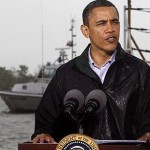Bring on the Disaster Czar
 President Obama can’t deal with the Gulf oil spill by himself. He should instead use existing laws to delegate power to someone with real political clout.
President Obama can’t deal with the Gulf oil spill by himself. He should instead use existing laws to delegate power to someone with real political clout.
If President Barack Obama wants to take charge of the BP oil spill, he should invoke the Robert T. Stafford Disaster Relief and Emergency Assistance Act and find a subordinate he can entrust with the law’s awesome powers. Both Presidents Clinton and George W. Bush involved use of the Stafford Act to great effect to deal with major disasters and the right implementation of the law’s power could speed the too-slow response to the spill.
A bit of background is necessary to understand why. The Stafford Act, in existence since 1974, allows the President to move money and resources from one part of the government to another, suspends many regulations for purposes of disaster response, and, through an easing of the Administrative Procedures lets the President rewrite many regulations. In short, it’s an awesome grant of pure executive power that lets the government do almost anything. The primary agency tasked with administering Stafford Act Powers, the Federal Emergency Management Agency, however, is an unusual bureaucratic creature: because the major powers of the Stafford Act are considered inherently presidential, FEMA directors have had only the powers the Presidents have cared to devolve. FEMA itself, furthermore, functions mostly as a “flow through.” Its tiny staff (the Bureau of Land Management is three times larger) exists mostly to requisition resources and rewrite regulations in the wake of an emergency rather than actually provide resources.
The agency has worked well when Presidents have devolved Stafford Act powers to someone they trust. Both Clinton and George W. Bush initially appointed right hand men from their home-state inner circles to head FEMA. Clinton’s appointee, James Lee Witt, was smart, likeable, and effective in dealing with everything from the Oklahoma City Bombing to major Midwest floods. Bush’s, Joseph Allbaugh, was dim, unlikeable, and, on 9/11, every bit as effective as Witt would have been. In both cases, the FEMA director’s ability to get the job done stemmed from a government-wide knowledge that the director of FEMA was to be given anything he wanted. When Witt or Allbaugh wanted money, helicopters, food, or anything else, every cabinet member knew that the order was as good as one coming from the President. FEMA collapsed following Hurricane Katrina not because the then-administrator Michael Brown was incompetent (he was actually much better at the job than Allbaugh) but, rather because he lacked the implicit trust of the President and, thus, the ability to order around the rest of the government.
To date, President Obama has exercised authority only under the Oil Pollution Act and tasked the able but hardly clout-heavy Thad Allen to coordinate the response. Current FEMA director W. Craig Fugate is a top emergency manager but also lacks real clout or access. While the Congressional Research Service points out that this approach may save money and avoid duplication of resources, it does nothing to improve the president’s actual management of the situation.
A truly powerful disaster “czar” can make hard choices that someone like Allen or even the President probably can’t make. If it’s a good idea to take some extreme action—say, lighting the spilled oil on fire, withdrawing a Navy SEAL underwater demolition team from the War on Terror to help patch the leak—a professional disaster manager actually has more room to make that decision than the President. With only the disaster to focus on, a clout-heavy manager has no need or political desire to try and please other groups (environmentalists don’t like burning oil, the Pentagon is convinced we’ll lose without SEALs in Iraq) and can cut through the clutter of competing interests to focus laser-like on the disaster.
Simply declaring a disaster under the Stafford Act, however, will not be enough. The law, in fact, is almost beside the point. The President also needs to appoint someone other than Allen to head up the response. It’s not that Allen is bad at his job. Just that he lacks clout. A member of the President’s inner circle with some management experience, lots of clout, and no real chance of getting major political office in the future—Valarie Jarrett and Rahm Emanuel come to mind—would probably the best choice. President Obama can’t deal the spill by himself. But any one of his most trusted subordinates could.
Existing laws give President Obama more power than he has used to date in order to manage the BP oil spill. He should delegate it to someone with real political clout.